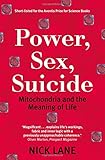In the book "Power, Sex, Suicide"[1], Nick Lane states:
"Curiously, aspirin is also a mild respiratory uncoupler; I do wonder how many of its more mysterious benefits may relate to this property"
He is talking about the mitochondrial respitarory chain. In this context, "uncoupled" means that the electron flow does not generate any ATP; instead, all the energy is dissipated as heat. The interesting thing is that uncoupling the electron transport chain reduces electron leakage ("free radicals") and less free radicals has been associatted with ageing and disease.
Will less electron leakage reduce chronic inflamation ? Who knows ...
Once again, the analogy with computer systems is pretty straightforward: If our back-end system is "inflamed" (read, under heavy load) due to incoming HTTP requests, uncoupling it with a message queue system will have anti-inflammatory effects.
[1] http://www.amazon.com/Power-Sex-Suicide-Mitochondria-Meaning...
[2] http://sciencecases.lib.buffalo.edu/cs/files/dinitrophenol.p...
As I remember from the book "Power, Sex, Suicide: Mitochondria and the Meaning of Life" [1], the bottleneck may be not the evolution of the intelligence, and not even of life itself, but specifically multicellular life. There are reasons to believe it only happened once, and for about 1bn years before that life already existed in single-cellular form, which gives an idea on how improbable the step from single to multiple cell organisms is. I am vague on specifics though, but can wholeheartedly recommend a book to anyone interested in evolution and origins of life.
[1] http://www.amazon.com/Power-Sex-Suicide-Mitochondria-Meaning...
A fascinating book "Power, Sex, Suicide: Mitochondria and the Meaning of Life" (http://www.amazon.com/Power-Sex-Suicide-Mitochondria-Meaning...) suggested that the multicellullar organisms on Earth evolved only once, when the symbiotic relationship between two types of bacteria was formed - one of them became "host", and the other became mitochondria and specialized for energy production.
The book suggests that the conditions for this to happen were very unusual and are unlikely to ever happen again. It does even suggest that this may mean that life in the Universe, more complicated that single-cell organisms, is very unlikely to evolve.
If eukaryotes evolved more than once, then there's some more hope for extraterrestrial life I suppose ...


https://www.amazon.com/Power-Sex-Suicide-Mitochondria-Meanin...